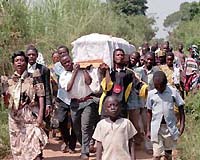| . |  |
. |
Hong Kong (AFP) May 27, 2009 The human swine flu toll in Asia grew Wednesday as Australia's infections more than doubled and Japan and South Korea announced new cases, helping to push the global total to almost 13,000. Singapore confirmed its first case while Hong Kong, where Asia's first infection from the A(H1N1) virus sparked a week-long quarantine of around 300 guests and staff at a city hotel, announced a fresh total of 10. In Australia, Health Minister Nicola Roxon warned that the nation faced "a changing situation" and said she expected "some significant increasing numbers (of cases) over the next couple of days." Authorities defended a decision to let 2,000 passengers off a cruise ship where there was a suspected swine flu outbreak, as the number of confirmed nationwide cases more than doubled in 24 hours to 59. Despite suspicions a number of people on board the Pacific Dawn liner docked in Sydney were suffering from the virus more than 2,000 passengers were allowed to return to the community Monday and told to self-quarantine for seven days. A total of 14 passengers have since been diagnosed with swine flu, with 172 people on board showing flu-like symptoms or reporting contact with someone who did. New South Wales state Health Minister John Della Bosca said quarantine officials did "exactly the right thing" but conceded that screening criteria would have to change to account for person-to-person transmission. "What I think is important to realise is that (infected passengers) weren't presenting as suspect cases according to the criteria at the time," Della Bosca told state radio. "The criteria is going to have to change ... now we do have evidence of community transmission." Meanwhile, Japan has seen a rapid rise in confirmed cases, saying Wednesday it had over 350. The figure included eight people who had tested positive at Narita international airport near Tokyo, the health ministry said. Two children who last week flew to Japan from the Philippines have also tested positive since their arrival. The seven-year-old boy and his four-year-old sister live in the Philippines but have been in the central Japanese city of Shizuoka since last week, municipal officials said. They arrived at Chubu international airport Friday with their parents -- a Japanese father and a Filipina mother -- and another sister. The nationalities of the infected children could not immediately be confirmed. In neighbouring South Korea two more cases of swine flu were confirmed, raising the country's total number of people infected with the virus to 29. The new cases were found in a 22-year-old Korean woman who arrived from Texas last week and in a South African teacher, a health ministry spokesman said. The teacher was from a language institute where a total of 19 teachers had been infected before Wednesday, he said. The virus has caused 92 deaths and infected 12,954 people in 46 countries since it was first uncovered last month, according to the WHO's latest figures. With the continued spread of the disease, the WHO enlisted scientists to help clear up the criteria needed for declaring a pandemic, amid concern the response of the Geneva-based body may have caused undue fear and disruption. "We are trying to see what kind of adjustments must be made to make sure that the definitions really meet the situation," said World Health Organization interim Assistant Director General Keiji Fukuda. The move follows appeals by several countries for more caution before moving up a step from the current phase five alert to declaring a pandemic for the new virus. Authorities in Mexico, the epicentre of the outbreak, said the death toll had risen to 85, and infected cases rose to 4,721 with scientists advancing through a backlog of samples. Share This Article With Planet Earth
Related Links Epidemics on Earth - Bird Flu, HIV/AIDS, Ebola
 Africa needs new AIDS battle plan, 30 years on: experts
Africa needs new AIDS battle plan, 30 years on: expertsNairobi (AFP) May 26, 2009 A new battle plan for fighting AIDS is needed in sub-Saharan Africa, the world's hardest-hit region, where most people with the possible deadly virus are unaware of their condition, experts said Tuesday. If after 30 years of the pandemic "90 percent of people living with AIDS do not know their status... 70 percent of people who need treatment are not getting it, then there is something we ... read more |
|
| The content herein, unless otherwise known to be public domain, are Copyright 1995-2009 - SpaceDaily. AFP and UPI Wire Stories are copyright Agence France-Presse and United Press International. ESA Portal Reports are copyright European Space Agency. All NASA sourced material is public domain. Additional copyrights may apply in whole or part to other bona fide parties. Advertising does not imply endorsement,agreement or approval of any opinions, statements or information provided by SpaceDaily on any Web page published or hosted by SpaceDaily. Privacy Statement |